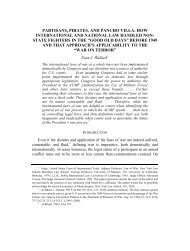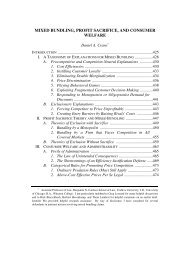life, liberty, and the pursuit of swords and armor - Emory University ...
life, liberty, and the pursuit of swords and armor - Emory University ...
life, liberty, and the pursuit of swords and armor - Emory University ...
Create successful ePaper yourself
Turn your PDF publications into a flip-book with our unique Google optimized e-Paper software.
1334 EMORY LAW JOURNAL [Vol. 57<br />
information readily available in <strong>the</strong> public domain; <strong>and</strong> (2) by requiring game<br />
developers to surrender such data. 222<br />
To obtain data available in <strong>the</strong> public domain, government agents could<br />
maintain a presence in MMORPGs <strong>and</strong> collect information like any o<strong>the</strong>r<br />
player. 223 “In <strong>the</strong>se instances, <strong>the</strong> observed avatars/persons can rarely argue<br />
that <strong>the</strong>ir privacy has been breached, as <strong>the</strong> information <strong>the</strong> government<br />
collects <strong>and</strong> uses was viewed <strong>and</strong> ga<strong>the</strong>red in an open, public forum where an<br />
expectation <strong>of</strong> privacy can rarely exist.” 224 Ga<strong>the</strong>ring data in this fashion<br />
would only raise privacy concerns should <strong>the</strong> government agents fail to<br />
properly identify <strong>the</strong>mselves or <strong>the</strong>ir assignment to <strong>the</strong> observed avatarperson.<br />
225<br />
Still, one scholar argues that privacy invasions could occur should <strong>the</strong><br />
government require game developers to relinquish information directly to<br />
prosecutors. 226 Yet, as long as <strong>the</strong> government follows <strong>the</strong> process for<br />
obtaining such information as delineated by <strong>the</strong> Electronic Communications<br />
Privacy Act (ECPA), 227 this scholar’s privacy concerns are moot. 228 Under <strong>the</strong><br />
ECPA, game developers would not be required to release information to a<br />
prosecutor unless <strong>the</strong> prosecutor had first obtained a warrant, a court order, or<br />
<strong>the</strong> consent <strong>of</strong> <strong>the</strong> subscriber to such disclosure. 229 Thus, although this scholar<br />
is justified in voicing such privacy concerns, this problem can be overcome as<br />
long as prosecutors ga<strong>the</strong>r data available in <strong>the</strong> public domain or from game<br />
publishers, if ECPA guidelines are followed properly.<br />
III. OTHER REGULATORY SYSTEMS<br />
Although it appears plausible to apply <strong>the</strong> MPC <strong>and</strong> most state <strong>the</strong>ft<br />
statutes to <strong>the</strong> <strong>the</strong>ft <strong>of</strong> virtual goods in <strong>the</strong> context <strong>of</strong> online video games, o<strong>the</strong>r<br />
regulatory systems could be applied to <strong>the</strong> <strong>the</strong>ft <strong>of</strong> virtual goods, as well. First,<br />
this Comment analyzes whe<strong>the</strong>r <strong>the</strong>re are o<strong>the</strong>r U.S. legal frameworks that<br />
could be applied to <strong>the</strong> <strong>the</strong>ft <strong>of</strong> virtual goods. Second, this Comment<br />
222 Id. at 243–48.<br />
223 Id. at 244.<br />
224 Id.<br />
225 Id. An agent’s failure to identify herself as a government employee is not a situation unique to<br />
MMORPGs. Id.<br />
226 Id. at 244.<br />
227 18 U.S.C. § 2703(c)(1)(B) (2006).<br />
228 Zarsky, supra note 221, at 244.<br />
229 Id.









